Trigeminal Neuralgia & Upper Cervical Chiropractic
Trigeminal Neuralgia (TN) is described as one of the most severe pains known to man. It is a disorder of the trigeminal nerve that produces sudden, excruciating bouts of facial pain. This pain typically strikes where the nerve branches to the nose, lips, eyes, ears, scalp, forehead, upper and lower jaw, and even the tongue.
TN most often affects only one side of the face, and, over time, the pain usually increases in severity and frequency. The pain is so intense that TN is often referred to as the “suicide disease.”
Common Medical Treatments
The most common medical treatments for TN include either prescription medications or surgery. Typical drugs used to treat this disorder are anti-seizure drugs, such as Tegretol® or Neurontin®. In recent years, different drugs such as Trileptal®, Topamax®, Depakote® and even anti-depressants have been prescribed for TN.
As a last resort, many TN patients consider surgery to end their suffering. According to the Mayo Clinic, the goal of most surgical procedures is to either damage or destroy the part of the trigeminal nerve that is the source of the pain.
Because the success of these procedures depends on damaging the nerve, one obvious side effect is facial numbness.
Some of the more common surgical procedures include Radiofrequency Rhizotomy, Glycerol Rhizotomy, Balloon Compression, Microvascular Decompression, and Gamma Knife. A recent medical report revealed a 50% failure rate for the surgical treatment of trigeminal neuralgia.
Can an Upper Cervical Correction Help?
The most common misconception about Upper Cervical care is that it only helps back and neck pain.
Upper Cervical care is based on the universal law of cause and effect. For every effect or symptom, physical or mental, there must be a cause.
Upper Cervical doctors recognize that the body is a self-healing organism, controlled and coordinated by the central nervous system, which is protected by the skull and spine.
Using a gentle technique, Upper Cervical doctors locate and remove interference to the nervous system, allowing the body to heal itself naturally without drugs or surgery.
Align Your Spine!
If the first two bones in your neck are misaligned, communication between the brain and body is interrupted and can cause numerous health problems.
Research shows that TN is caused by irritation or damage to the trigeminal nerve and the central trigeminal system in the upper spinal cord and brainstem. Medical reports also suggest that trauma to the head, neck, and upper back can injure the nerve pathways in the spinal cord and brainstem and cause TN.
If you currently suffer from Trigeminal Neuralgia and would like to seek advice from an Upper Cervical Chiropractor, please schedule an appointment today.

